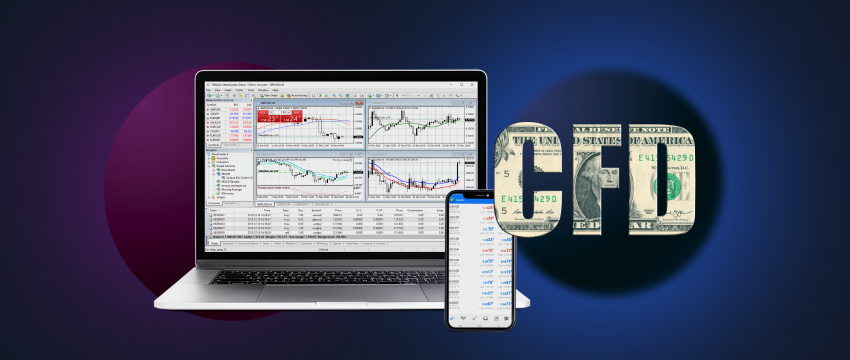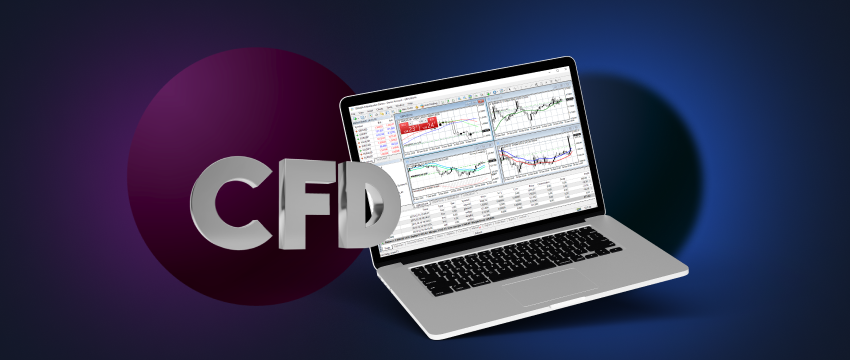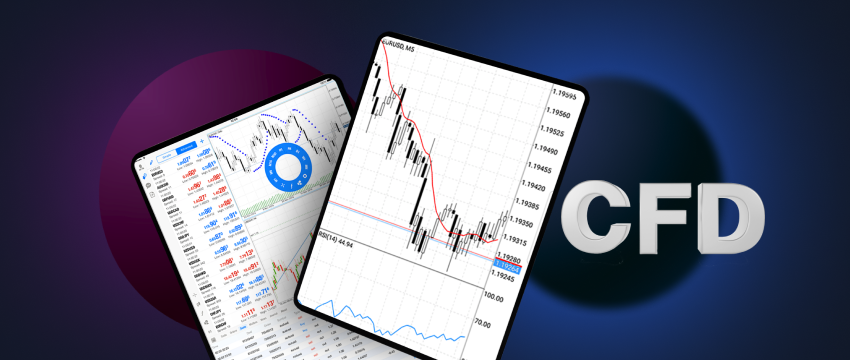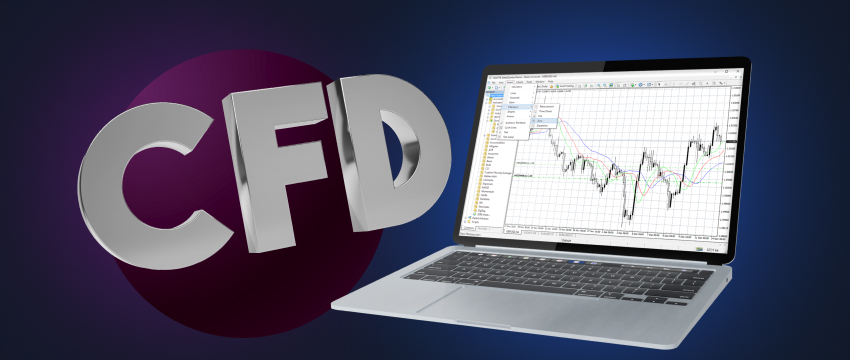CFD stands for Contract for Difference. It is a highly popular derivative product among forex and commodities traders. They use it to access and trade their favorite assets.
A trader and a broker enter into a CFD contract that allows the trader to speculate on the financial markets. The asset can be anything ranging from الأسهم, currencies, metals, commodities, indices, futures, and where available cryptocurrencies.
Price speculation vs ownership of underlying asset
CFDs are unique financial products because the trader never actually owns the underlying asset. Instead, they speculate on the direction the asset’s price will take, whether up or down. They attempt to make a profit from the price movement.
In this way, the trader is able to take long or short positions. For example, if a trader speculates that the price of gold will rise, they’ll go long (buy). If they think gold prices will fall, they’ll likely go short (sell). The difference between the opening and closing prices is the potential profit or loss.
Highly leveraged financial derivatives
People probably best recognize CFDs for their high leverage. This means that a trader can open a larger CFD position for a relatively little sum of money. By investing a fraction of the value into a trade, leverage can increase both profit and loss.
Effective management is crucial in this context. Markets moving in opposite directions often cause dramatic and unexpected price fluctuations.

A tool for the diversification of a trader’s portfolio
Traders can trade CFDs on a wide range of global markets and use them to diversify their trading portfolios. This typically allows for 24/7 access to major global markets. It offers trading opportunities across multiple sessions and time zones.
Common events driving CFD asset prices
Movements in the relevant underlying market impact CFD prices. This is why traders must maintain vigilance when monitoring those markets, to mitigate unanticipated price movements which often times lead to adverse financial outcomes. So, what news or events (key releases) do traders need to track? The most important include:
- Economic releases.
- Central bank announcements.
- Geopolitical tensions.
- Interest rate decisions.
- Unemployment rates.
- Trade agreements.
- Natural disasters or war.
- Consumer confidence.
- Business sentiment.
- Industrial production.
- Retail sales.
Tracking key releases for informed trading decisions
There are several ways a trader can track key releases, one of the most popular being an Economic Calendar. It is an incredibly useful tool as it tells traders when certain market moving events are happening. T4Trade’s Trading Central Economic Calendar integrates key features such as:
- اطلع على الأحداث الاقتصادية في 38 دولة والتي يتم إعداد رسوم بيانية لها وفقًا للمؤشرات المستهدفة. يمكنك تصفية المؤشر المفضل لعرض السعر المعني والرسم البياني للحدث من أجل اتخاذ قرارات التداول في الوقت المناسب في وقت حدوث الأحداث.
- Access to economic events for 38 countries mapped to target indices. Filter preferred index to view corresponding price and event chart for timely trading decisions as events happen.
- Insights on historical trends and their impact on currencies plotting out the last 5 years of forecast and actual values for each economic event.
- Access to real-time, updated macro-economic data for more accurate trading decisions.

Automated (algorithmic) trading and CFDs
Automated trading is becoming increasingly popular in the CFD trading space. This is no surprise considering the level of trading efficiency and faster transaction execution that algorithmic trading provides; as well as the removal of human emotions from decision making, resulting in more objective, data-driven trades.
Other reasons that algo trading systems have become so popular amongst CFD traders is that they can analyse and trade multiple CFD instruments across different markets at speeds that no human can achieve. Automated trading also enables traders to backtest their strategies using historical data.
Trading strategies and CFDs
CFDs are incredibly versatile and can be used for implementing a variety of trading strategies. Day traders can use CFDs to maximise potential returns on short-term price movements, whilst swing traders can speculate on price movements without having to physically own the underlying asset.
Scalpers can also use CFDs to profit from small price changes with high frequency, while trend traders can easily go long or short making it easier to follow trends, regardless of market direction. For a position trader, CFDs offer the flexibility to hold long-term positions, and the ability to go short.
CFDs and risk management
CFDs are often referred to as high-risk products, largely because they are highly leveraged. Leverage ultimately allows the trader to scale up a position with limited capital (known as margin). However, total profit or loss is calculated based on the full position size and not the margin amount. This means that both profit and loss can be magnified and that leverage should be used carefully.
To better manage the risks inherent to leverage requires the adoption of a risk management plan to protect one’s capital. The most commonly used risk management tools include stop-loss orders which are triggered when an open position reaches a particular price level, at which time the position is exited to reduce losses; and take-profit orders that close positions when a price reaches a preestablished profit level. Traders also make use of trailing stops which refer to the adjustment of a stop price when the market moves in a desired direction.
Learning how to trade CFDs
For a beginner trader looking to expand their CFD trading expertise, opening a demo trading account is probably going to be the most practical way to do this A demo account gives you the opportunity to enter and exit trades using virtual money, thereby not putting your own capital at risk. It gives you the time to monitor those trades and assess outcomes at your own pace, regardless of level of complexity.
A demo trading account offers a trading environment that simulates real market conditions, providing the perfect means to boost your skills and become more familiar with what trading CFDs in real time will look like. It also provides a trader with the opportunity to learn how to use technical analysis, one of the most critical components in CFD trading.
In addition to a demo trading account, most brokers also offer educational resources to acquire more knowledge about trading CFDs. For instance, T4Trade’s Education provides traders with access to webinars, podcasts, videos-on-demand, and Live TV, which offer carefully curated insights into core CFD concepts to help a trader become more skilled. Furthermore, T4Trade blogs are also great resources for CFD related information.

Trading with a CFD broker like T4Trade
One of the most important elements of CFD trading is choosing a CFD broker that best aligns with your budget, goals, and needs. T4Trade is an award-winning global CFD broker with global clients. The broker is regulated, trustworthy and reputable, and has an expert team of researchers and analysts who are well-versed in all things CFD trading.
The broker offers flexible trading conditions, multiple trading accounts to choose from, and an exceptional customer support team that is available 24/5 to assist you via Live Chat or email. T4Trade also offers swift execution of trades, and quick and easy deposit or withdrawal of funds.
Additionally, with its diverse range of assets, you’ll likely find your preferred market to trade. And finally, with T4Trade, you’ll gain access to the MetaTrader 4 (MT4) trading platform, probably the most popular trading platform in the world that is suited to all types of traders, regardless of experience.
إخلاء مسؤولية: This material is for general informational and educational purposes only and should not be considered investment advice or an investment recommendation. T4Trade is not responsible for any data provided by third parties referenced or hyperlinked in this communication.




